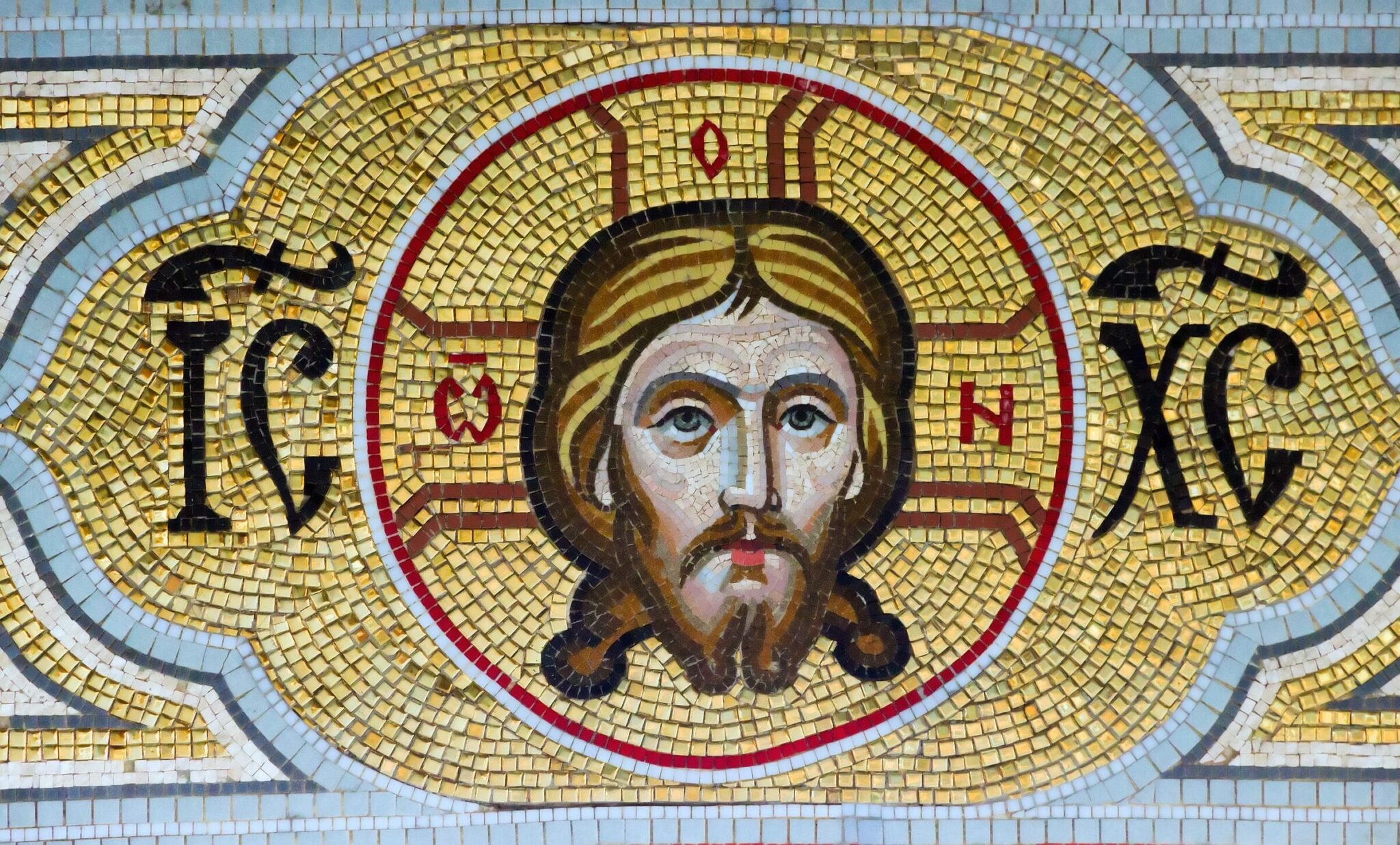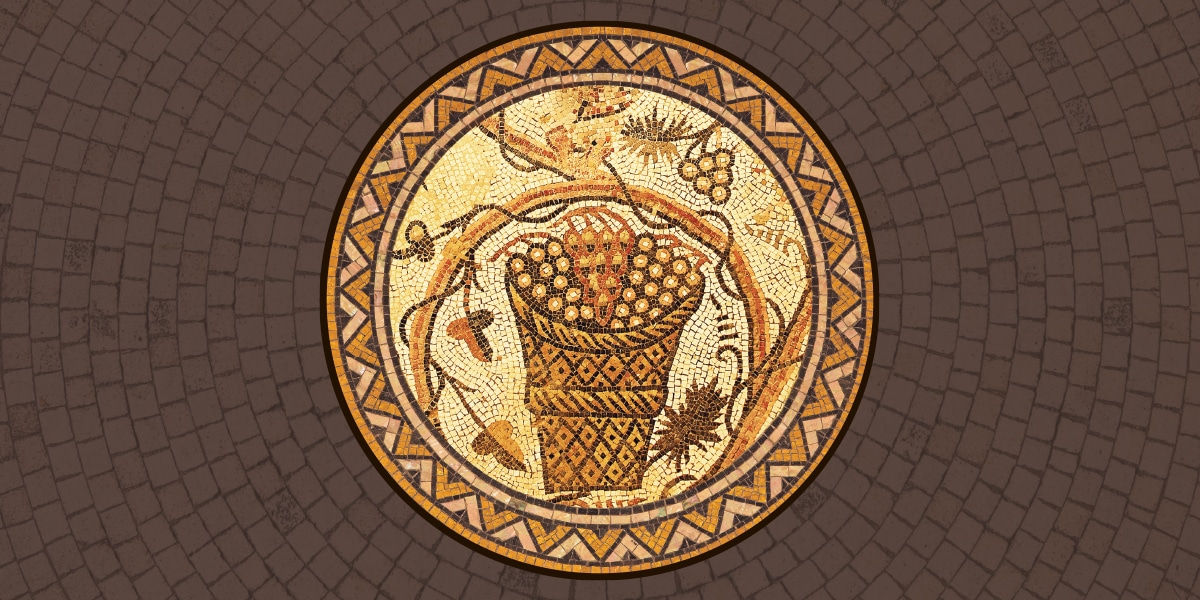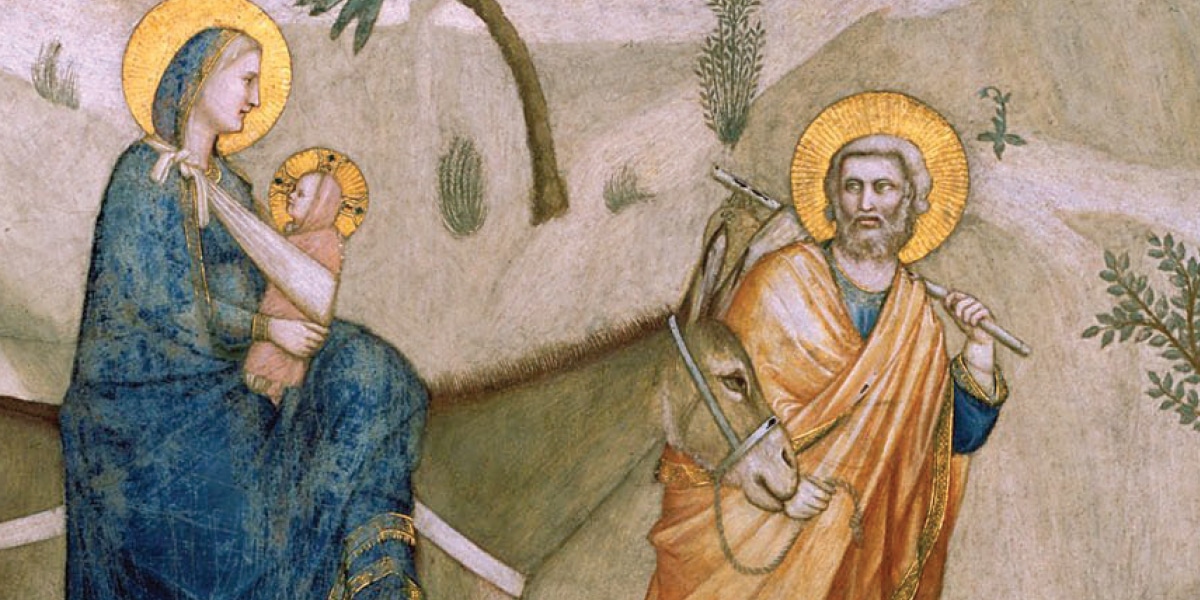Behind the main altar at the National Shrine of the Immaculate Conception in Washington, D.C., looms a powerful image of Jesus. Towering over all from the sanctuary, he has a stern face, regal robes, flames shooting in three directions from a halo. The mosaic is framed by the proclamations of the Church throughout history: “Christ Conquers, Christ Reigns, Christ Rules, Eternal Vicar, Eternal King, His Power Is Everlasting Power That Shall Not Be Taken Away.” Word, image and architecture together express a cosmic message.
Not a five-minute walk behind that worship space, in an old stone building on The Catholic University of America campus, a different portrayal of Jesus is under way. There Msgr. John P. Meier labors over ancient texts, exchanges e-mail with scholars of several faiths and many nations, and produces books about Jesus that have brought Meier worldwide attention. His three- or four-volume work (two volumes are published), A Marginal Jew: Rethinking the Historical Jesus, weighs heavily in a raging scholarly—and sometimes public—debate about Jesus of history, Jesus of Nazareth who walked this earth.
Christians believe that Jesus was both fully divine and fully human, “true God and true man,” as we say in the Nicene Creed each Sunday. For at least the third time since the birth of modern scientific thinking in the 1700’s, there is a renewed interest among some biblical scholars in what they call the “historical Jesus.” These scholars seek to find the man behind the many traditions surrounding Jesus.
Hermann Reimarus was a German scholar whose book, An Apology for the Rational Worshipper of God, started the first historical Jesus quest in 1774. There was another surge of interest in the 1800’s, focusing on the “religious personality” of Jesus. Criticism of that quest culminated earlier this century with the writings of Rudolph Bultmann, who tried to separate Christ from the historical Jesus. During the past two decades we have been full swing in a new quest, with scholars publishing a steady stream of works on Jesus of history.
It’s a peculiarly modern quest—unlike the ancient or medieval worlds, our age wants the facts. Some in our society would say, “If you can’t measure it scientifically, it isn’t real.” Meier doesn’t buy that. And he would fault the most publicized current historical Jesus scholarship—notably a group called the Jesus Seminar—with falling into that trap.
The California-based Jesus Seminar was founded in 1985 by Robert W. Funk, a prestigious scholar who left Ivy League university life and moved west. The Seminar has conducted a highly publicized examination of biblical texts, attempting to sort out what in the New Testament Jesus truly said and what was ascribed to him by the New Testament writers. Their findings seem guaranteed to create a public uproar each time the 60-plus-member seminar meets. The Seminar scholars meet and debate what Jesus really said and did as opposed to what is written in the New Testament. Then they vote with color-coded beads—red for “Jesus really said it,” pink for less certainty, gray and black for even less.
Regardless of his disagreements with the Jesus Seminar, Meier draws a careful distinction between Jesus of history and Jesus the object of our faith. There’s a connection between the two, certainly, but history cannot measure what we learn through faith, he says. His study of the historical Jesus paints a picture not unfamiliar to Christians—Jesus was indeed the real historical figure that the New Testament says he was. Yet the New Testament is not a modern history book.
Msgr. Meier, 55, is a professor of New Testament in the Biblical Studies Department at Catholic University of America, where he has taught since 1984. He holds a doctorate in sacred Scripture (1976) from the Biblical Institute in Rome, where he graduated summa cum laude and received the papal gold medal. He had received the same honors in 1968 when he graduated from the theology program at Gregorian University. He is a former president of the Catholic Biblical Association (1990-91), has authored numerous books and is widely published in a variety of journals and reference works. He has been editor of Catholic Biblical Quarterly.
In a recent Catholic University interview with St. Anthony Messenger, Msgr. Meier explains why he considers studying Jesus of history to be worthwhile and what he sees as the serious shortcomings of some scholars studying the historical Jesus.
Eye of the Beholder
Why do we need Jesus scholarship in the first place?
The need is in the eye of the beholder. If one is a professional historian, then one is interested of course in the great figures of history that had an impact on history, whether one believes in them or not….I don’t think we need any more apologetics for a quest for the historical Jesus as a historical discipline, say in the department of history, than you would have to apologize for trying to find out something about the historical Socrates or the historical Plato or the historical Mohammed.
I think a lot of the confusion comes from the fact that people claim they are doing a quest for the historical Jesus when de facto they’re doing theology, albeit a theology that is indeed historically informed. Go all the way back to Reimarus, through Schleiermacher, all the way down the line through Bultmann, Kasemann, Bornkamm. These are basically people who are theologians, doing a more modern type of Christology [a faith-based study of Jesus Christ].
Would a historian rule out miracles and divine intervention, then?
That is a very ticklish subject. I don’t know how in the world you would decidehistorically whether or not Jesus did or did not in fact perform miracles possible only by God alone. It’s a matter of faith. Yet is it fair for a historian to enter into the question saying that obviously miracles are impossible and, therefore, Jesus did not perform any miracles?
The historian should try as much as possible to be quite modest in claims about what can be known about claims about miracles—especially from the ancient past where our sources are quite fragmentary. The proper stance of a historian is, “I neither claim beforehand that miracles are possible, nor do I claim beforehand they are not possible.”
Truth of the Resurrection
Can historians address the Resurrection, then?
We can verify as historians that Jesus existed and that certain events reported in the Gospels happened in history, yet historians can never prove the Resurrection in the same way. Why not?
Perhaps some fundamentalists would claim you can. Apart from fundamentalists, perhaps even some more conservative Catholic theologians would claim you could. I myself along with most questers for the historical Jesus—and I think a fair number of Catholic theologians as well—would say the Resurrection stands outside of the sort of questing by way of historical, critical research that is done for the life of the historical Jesus, because of the nature of the Resurrection.
The resurrection of Jesus is certainly supremely real. However, not everything that is real either exists in time and space or is empirically verifiable by historical means.
What do you think happened to Jesus’ body?
The true Jesus who had died rose in the fullness of his humanity into the full presence of God. That is, I think, the essence of belief in the Resurrection. What the relationship of that risen body is to the body that was laid in the tomb is first of all not something that is historically verifiable. It is not subject to historical research at all.
Indeed, theologians among themselves disagree on that question. The fundamentalists would almost have a rather crass resuscitation view. Most traditional Christians have at least read Paul, First Corinthians 15 about the necessary transformation, as well as the Resurrection appearance narratives in the Gospels. They think in terms of transformation as well as continuity.
Thus the risen body of Jesus is indeed in continuity with the body laid to rest in the tomb. But nevertheless it has undergone radical transformation as a glorified, risen body. It is no longer of this world of time and space and not subject to its laws.There is a whole range of speculative possibilities about the precise relationship of the risen Jesus to the body laid in the tomb. As a person trying to pursue historical work, that is something beyond what I can investigate.
Faith and Reason
Is there a relationship between the historical study and faith-reflection on Jesus?
I would say very much. But does basic, authentic Christian faith absolutely have to have a historical quest for the historical Jesus? The answer is obviously no. Ancient, medieval, early Christians never had such a thing. Who would question the legitimacy of their Christian faith in Jesus Christ?
Therefore, the historical quest for the historical Jesus is not essential for simple, authentic Christian faith. Even today in the Third World there are all sorts of uneducated, illiterate peasants who would not know a word about historical Jesus, theology or anything else, who I’m sure have a very strong, authentic Christian faith and maybe much better than mine.
Theology never floats outside history. It’s not very surprising, therefore, that Reimarus’s quest during the Enlightenment looks rather different from Schleiermacher’s quest during German romanticism, looks rather different from Bultmann’s quest during the heyday of existentialism in Germany. It all looks very different from the Jesus quest whose Jesus looks like a politically correct American academician who’s an egalitarian feminist at the end of the 20th century!
For Aquinas with the rebirth of Aristotelian thought in the Middle Ages in the West, that meant a certain Aristotelian approach. If he was going to both reflect the culture of his time and speak meaningfully to educated people of his time, what else was he to do?
Hence if Christians today wish to articulate their faith in Jesus Christ in a fashion that reflects and speaks to the culture they live in, there has to be some awareness of historical critical consciousness. The patristic and medieval periods did not have that concern.
Does each age, then, cast Jesus in its own image?
There is perhaps something of both the danger and the challenge; yet there’s a relevance there. You notice that doesn’t hold true so much for the basic affirmations of faith. That’s the importance of certain basic credal affirmations that try to remain as fundamental, as unspeculative and undeveloped as possible. They try to boil down what is essential.For example, the Council of Nicea [in 325] basically says the same thing in the creed that we recite today. There are certain basic faith affirmations that as far as possible try to steer clear from extensive philosophical systematic development, that try to say only the essential. That is what is required for membership in the Church.
Notice the Church has never required for membership that you must accept Augustine’s neo-Platonic understanding of the Trinity by way of an intellectual analogy. Catholics are not required to accept the whole Thomistic, neo-Aristotelian system of the Middle Ages, or accept Karl Rahner or Bernard Lonergan’s 20th-century understanding of Christology. The Church has never imposed the grand philosophical system of the day on ordinary believers as a necessary part of believing.
What has been revealed by God through Jesus Christ is the object of our faith, says the Church. We then in any given culture try to tease that out, try to understand it first for ourselves and make it intelligible to the world around us. That’s a necessary undertaking in every age.
When you think of Augustine’s great tracts, when you think of Thomas’s Summa, were they addressed to the peasants working out in the field? Obviously these were intellectual approaches to the faith, were meant to speak to educated people.
Let’s face it: In any given age it’s the educated people who are more tempted to an intellectual despising of Christianity….Making the faith intelligible to an educated group in any given society is an important part of the process. Given the fact that our culture is a historically critical one, it’s very important.
Tabloid Testament?
You once described Jesus scholarship as being currently in the “terrible two’s.” What did you mean by that?
I was talking there precisely about the discourse and debate among scholars, back and forth. Certainly at this point in the quest for the historical Jesus among the Jesus Seminar, Catholics replying to the Jesus Seminar, evangelical Christians replying to it, even mainline and more liberal Protestants who don’t like what’s going on, you do have a very lively if not at times raucous debate among scholars today. I simply said, “Well, what do you expect?” Isn’t that true of scholarship in many fields at given times? Precisely when there’s great ferment there’s going to be a lot of arguing back and forth and a lot of negating of positions. There’s nothing wrong with that.
The back-and-forth critique is just an essential part of the scholarly process, right?
I think it’s a positive stimulus.I guess what’s bedeviling is that so much of the controversy is picked up by the secular press and reported so widely that it leaves a lot of us wondering what’s happening.
A great exegete at Louvain University had been writing me recently and I sensed that both he and I think a good number of Europeans are completely puzzled, if not aghast, at the Jesus Seminar and the phenomenon around it. I wrote him saying, well, you have to understand all life in the United States including academia, including scholarship, has undergone a certain “O.J. Simpsification.” Everything has been turned into televised soap opera. Robert Funk, head of the Jesus Seminar, at one point was planning televised sessions of the Jesus Seminar in which there’d be debates and then scoring; it almost sounds like a hilarious send-up. You can’t mock it because it is such a caricature even to begin with!
But I think one of the great problems is precisely that. Serious scholars have—my goodness, down from Reimarus onward—a whole history of writing serious works on a serious topic. And none of them, thank God, ever descended to the TV tabloid-show approach. This, unfortunately, is a uniquely American phenomenon of just the past two decades.
Does that approach to scholarship, with the voting and so on, point to some kind of malaise?
The way Funk trumpeted it, the way he had the news people in, the original colors of beads—which I believe they’ve given up now—was so much P.T. Barnum showmanship that I think you have to ask: Was form overcoming substance at some point?
Secondly, I think from early on certain leading figures in the Jesus Seminar were quite determined to push through their agenda and their picture of the historical Jesus: namely, it was going to be a Jesus without future eschatology, a Jesus speaking totally about the present moment, a Jesus therefore who looked somewhat gnosticisizing [Gnostics believed Jesus was never human and that the physical realm is evil] rather than a Jewish prophet or apocalyptic figure.
It was going to be a Jesus at least in some cases who turned out to be a Greco-Roman Cynic philosopher, which was especially mind-boggling!
Can you tell us in plain language what is a “Jesus without a future eschatology”?
What seems so central in Jesus’ teaching as it lies there in the Gospels is that he is speaking of a future coming of the kingdom of God, a consummation of Israel’s history in the apparently near future, that would bring about a radical change in human life. This change would not be brought about so much by human effort but by a definitive action of God at the end of time, at least time as we know it. “Thy kingdom come” is a very central petition of the Lord’s Prayer itself.
Some scholars contend that that was all later Church apocalyptic fantasy; that wasn’t Jesus himself at all. To them Jesus was simply this wise sage and Cynic philosopher telling everybody just to realize the presence of the invisible presence of the kingdom right in their own everyday lives.
We may have found this Jesus figure useful to wake us up but basically then—in true American fashion—we are self-saved because we realize how wonderful we are.
So this Jesus is a projection of American culture?
I think there’s a great amount. When you find out that Jesus actually was a radical egalitarian feminist socialist with a social agenda, one cannot help but think that a great deal of politically correct 80’s and 90’s academic life is being read back into this first-century Jew.








